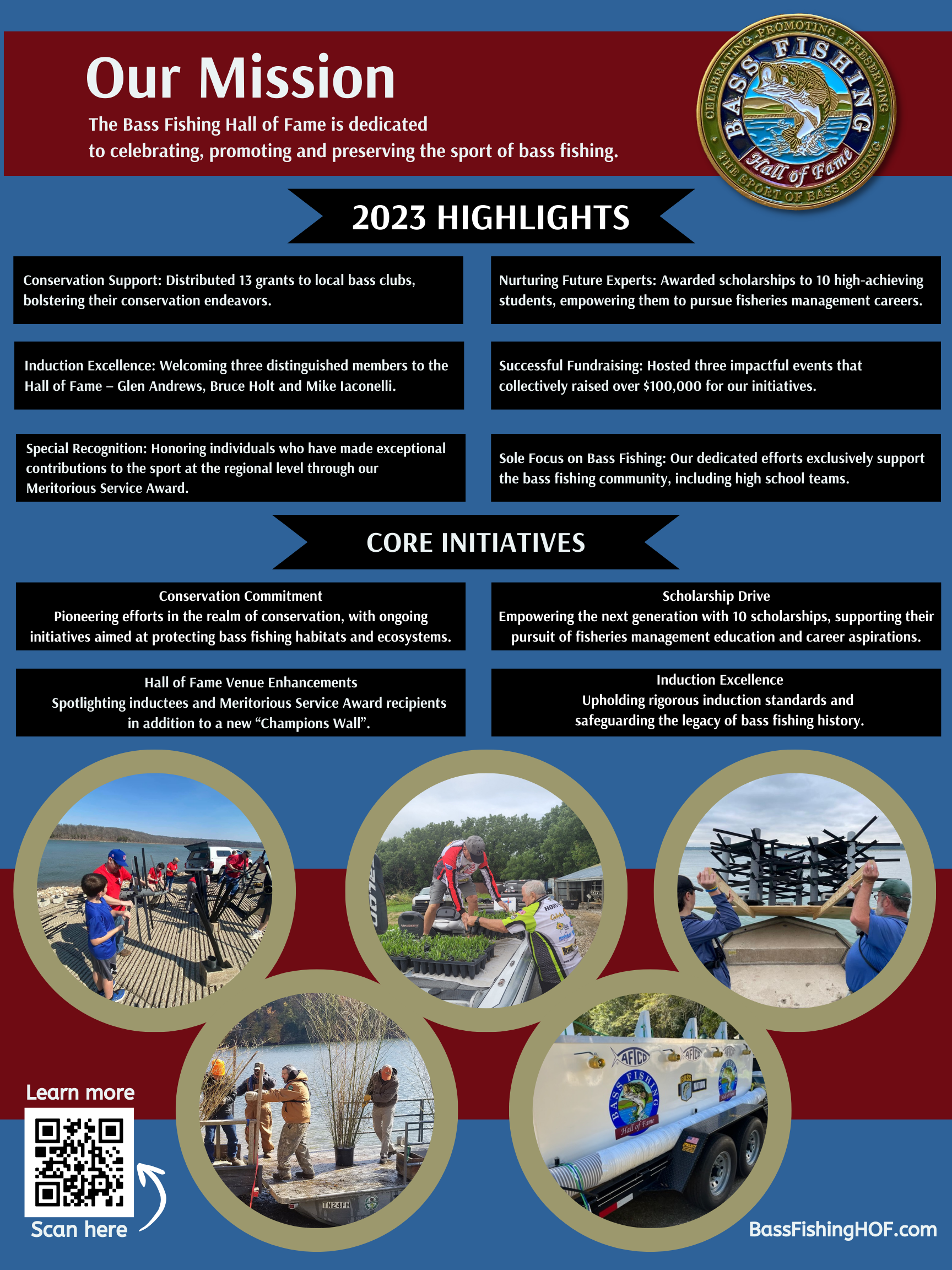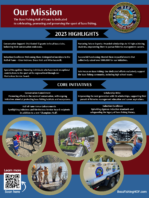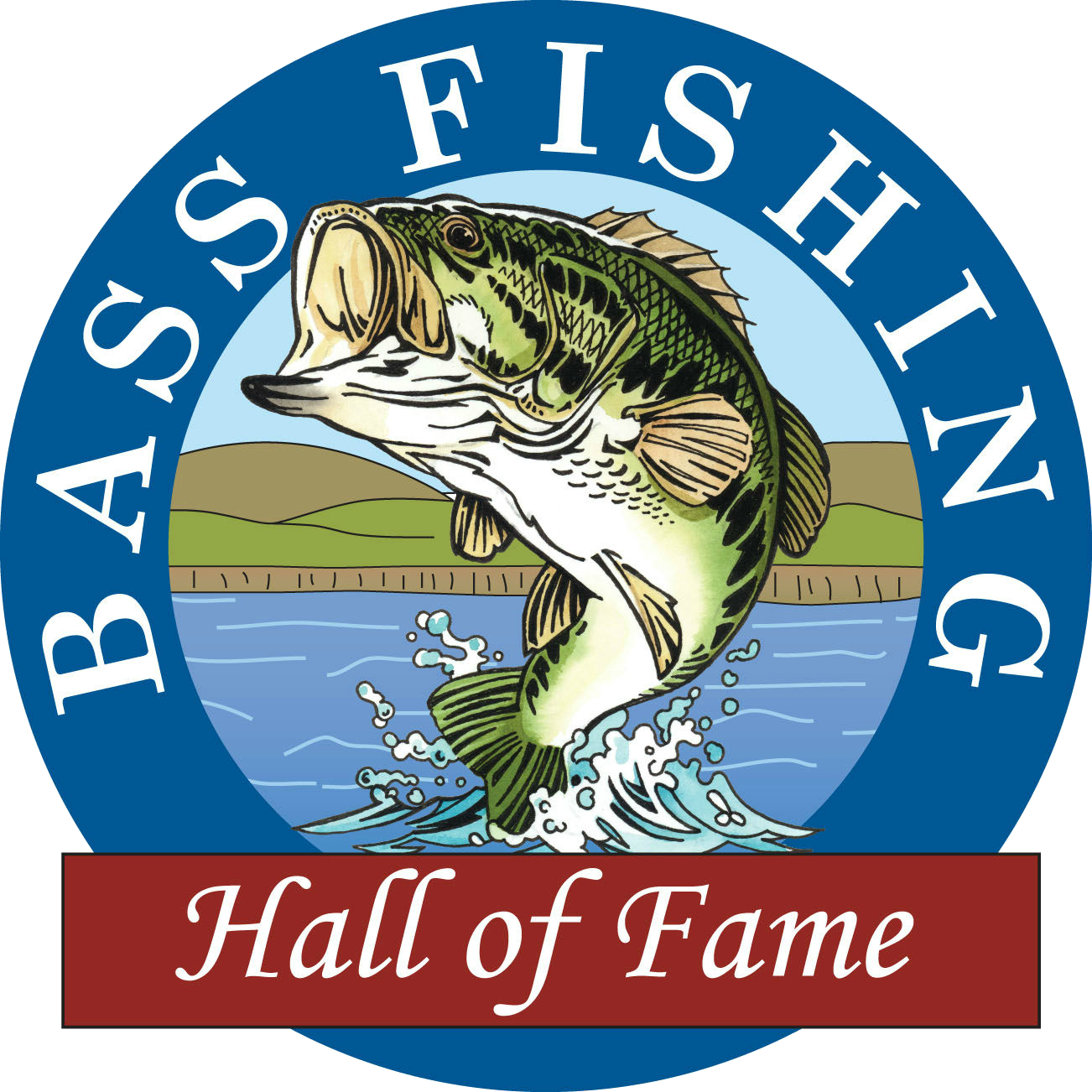Grants
Join us in making a splash for conservation with the Bass Fishing Hall of Fame Grant Program! We're dedicated to funding approved projects, especially those led by grassroots bass organizations, that empower youth to champion conservation efforts in local fisheries. Eligible projects actively involve young enthusiasts, emphasizing resource stewardship and anglers' roles in conservation. Endorsed by local fisheries management agencies, these initiatives focus on habitat protection, invasive species management, tournament fish care, public access enhancement, pollution mitigation, and innovative conservation education. Scholarship applications due by April 15, 2025
Scholarships
Harnessing our extensive network within fishery management across state, federal, and provincial levels, we recognize the urgent demand for future fishery and natural resource professionals, Many of these experts emerge from the ranks of recreational anglers, particularly bass fishing enthusiasts. This initiative not only aligns with our mission of celebrating, promoting, and preserving the sport but also significantly impacts well-managed recreational fisheries across the U.S. and Canada. By providing financial assistance to aspiring students, we not only support their educational pursuits but also contribute to the business aspect of our sport. Together, let's ensure thriving bass fishing waters for generations to come. Grant proposals due by May 1, 2025.


Bass Fishing Hall of Fame Grants to Fund Eight Habitat Projects in U.S. and Canada
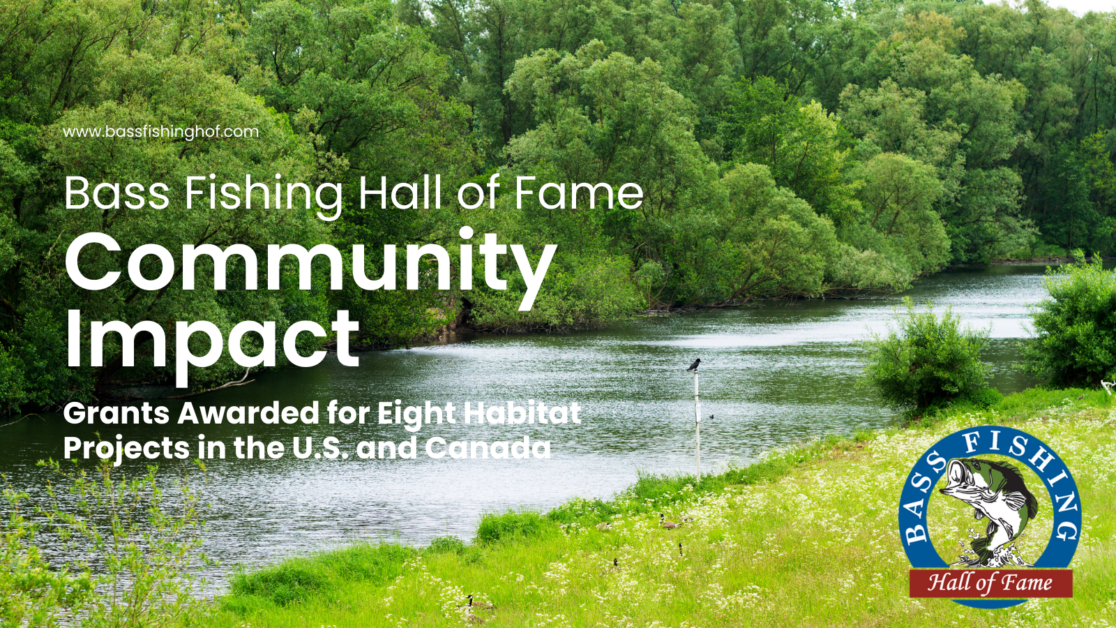 As part of its mission to celebrate, promote and preserve the sport of bass fishing, the Bass Fishing Hall of Fame’s Board of Directors is again providing financial support to numerous conservation projects that will enhance fisheries in New Mexico, Illinois, Kansas, Tennessee, South Carolina, Virginia and Ontario, Canada.
As part of its mission to celebrate, promote and preserve the sport of bass fishing, the Bass Fishing Hall of Fame’s Board of Directors is again providing financial support to numerous conservation projects that will enhance fisheries in New Mexico, Illinois, Kansas, Tennessee, South Carolina, Virginia and Ontario, Canada.
Over the past five years, the BFHOF’s Board has reached out to local and state bass fishing clubs working with state agencies to provide needed funding for various conservation projects they initiated.
“With these new grants, we’ll have committed more than $140,000 in support of fishery enhancement projects,” said BFHOF conservation committee chair Gene Gilliland. “These bass clubs have boots-on-the-ground members who donate their sweat equity on these projects, while the Hall provides financial support for needed equipment, fish-holding underwater structures, and other needed gear to help make the projects a reality.”
The eight fishing organizations and bass clubs receiving Bass Fishing Hall of Fame grants in 2024 to enhance and preserve bass fishing are:
New Mexico – The Canadian River Bass Club will engage members as well as area youth anglers to utilize abundant driftwood to create a new means of establishing man-made fish habitat in Cochiti Lake.
Illinois – The Friends of Everbloom, with help from Illinois DNR and area youth anglers, are enhancing various forms of habitat ranging from vegetation to MossBack Fish Habitat, at Lake Bloomington and Evergreen Lake.
Kansas – The Leavenworth Bass Club will build a 20–feet–by–24–feet greenhouse to propagate native aquatic plants to be planted along three miles of shoreline at Banner Creek Reservoir.
Kansas – The World Fishing Tour, Lady Bass Anglers Association and the Kansas B.A.S.S. Nation are working together to build a live release trailer with four 150-gallon tanks to serve 40 events a year in the Sunflower State.
Tennessee – The Tennessee B.A.S.S. Nation, its youth anglers, and TWRA fisheries personnel, are working together to further a decade-long habitat enhancement crusade at fisheries such as Halford Lake, Percy Priest, Normandy, Tims Ford and Watts Barr.
South Carolina – The Clarks Hill Committee of the CSRA is working with help from local high school fishing teams to establish viable eel grass colonies.
Virginia – Foothills Youth Fishing Club anglers will be building and placing habitat marked with shared GPS locations for use by the general angling public in Northeastern Virginia.
Ontario – The Ontario B.A.S.S. Nation plans to establish 140 brush piles in seven watersheds of the Ontario Great Lakes, an effort with nine successful years of positive impact to date.
The Bass Fishing Hall of Fame will hold its annual induction dinner on Thursday, Sept. 26, 2024 at Johnny Morris’ Wonders of Wildlife Museum and Aquarium in Springfield, Mo. There will also be a concurrent auction (visit www.BassFishingHOF.com for details) as part of the annual Celebrate Bass Fishing Week with funds raised going to assist the Board with funding conservation grants such as these and other worthy endeavors benefiting the sport of bass fishing.
###
Catching up with BFHOF scholarship recipient Natalie Coash
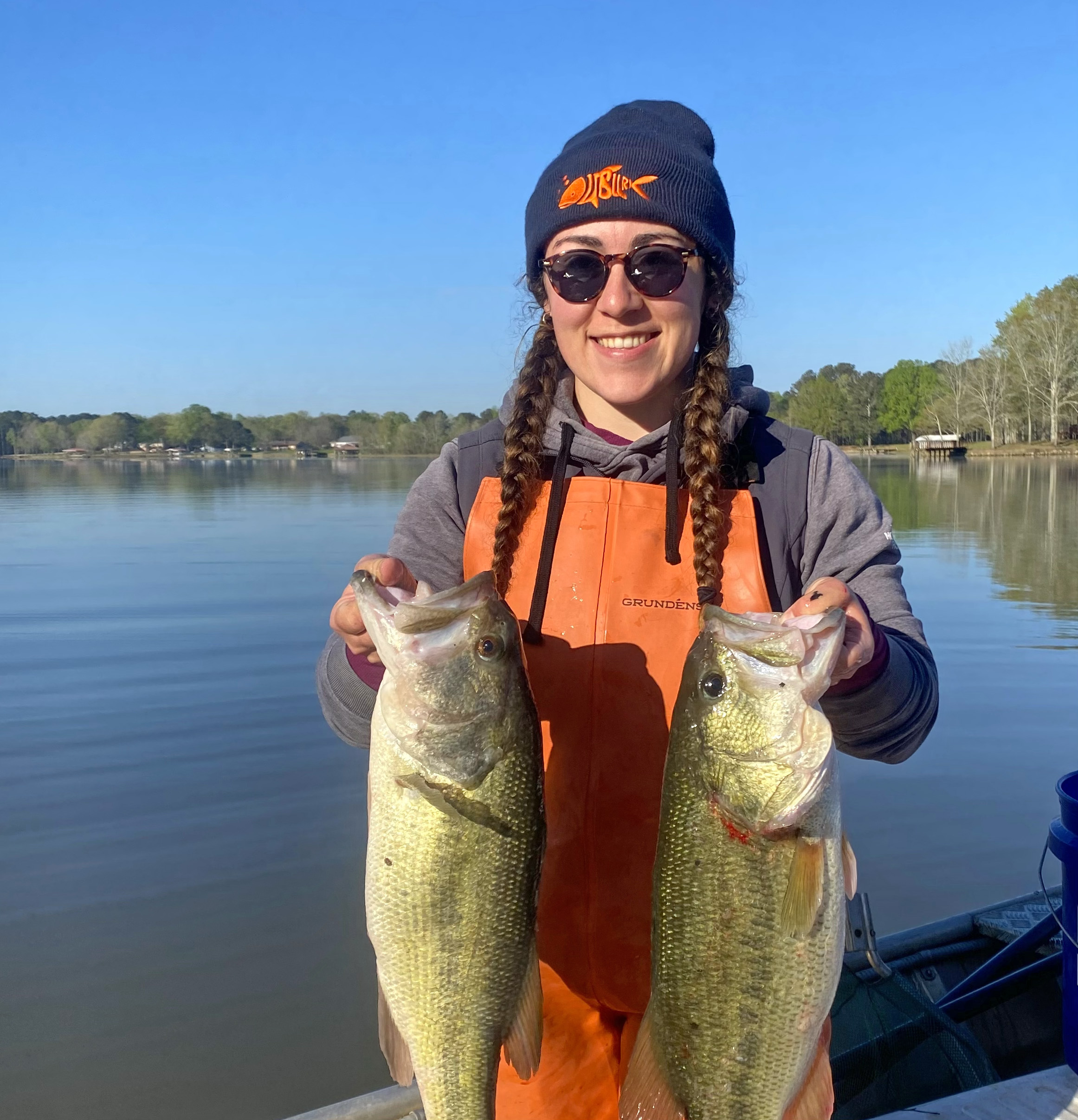
BFHOF: What was your primary motivation to pursue a degree in wildlife and fisheries?
Natalie: Mostly to satisfy a genuine curiosity about many of the things I love in the outdoors. Plus, fisheries research and management is stimulating and challenging, while also allowing me to have an active hand in conservation.
BFHOF: What’s the average cost for a year of tuition, as well as rent?
Natalie: Tuition, rent, utilities, and health insurance total about $16,000 a year, and my graduate student salary from Auburn is $20,000.
BFHOF: Were you surprised to learn you had been chosen by the Bass Fishing Hall of Fame to receive a $2,500 scholarship?
Natalie: Absolutely! Before I moved to Auburn to study largemouth bass under the Sportfish Restoration Act, I primarily worked with cold water species such as salmon and trout. I took this graduate position in the South to diversify my foundation early in my young career. This is my first time working in the South with such a popular sport fishery and its stakeholders. I’ve worked hard to immerse myself in this fishery and the management goals of ADCNR. So, this award from the Bass Fishing Hall of Fame serves as gratification that I’m on the right track.
BFHOF: What is your biggest challenge, toughest class, or most time-consuming task?
Natalie: Mostly just dealing with the travel expense associated with attending the funerals of more than one family member this past year. So, taking extra time and money as a busy student to take care of myself, and assure my success at both home and work.
BFHOF: Tell us about what you’re working on currently.
Natalie: The objectives of this current study are to evaluate the trade-offs between fishing quality and economic benefits across a gradient of increasing black bass tournament fishing effort at Neely Henry Lake, a 4,500-hectare reservoir within the Coosa River Basin in northeast Alabama.
We utilize a dynamic age structured simulation model that includes a sub model for fishing-related economic expenditures. The model is informed by a current intensive reward/telemetry tagging study being conducted on Neely Henry as well a tournament and nontournament bass angler survey.
The angler survey utilizes a mixed methods approach including access point and roving creel survey methods with contingent behavior questions to further understand the angler effort and behavior of both groups of anglers in several hypothetical management scenarios.
In summary, we came up with a framework to evaluate tradeoffs between fishing quality and the economic performance of tournament angling. Agencies can utilize this information to construct management regulations that maximize the benefits of the tournament fishing industry as well as support a high-quality fishery with desirable catch rates and size structure.
I just finished the last of my fieldwork at Neely Henry Reservoir; While I’ll miss the boat time, I look forward to traveling across the country to communicate with other biologists at conferences about the complex bass fishery at Neely Henry Reservoir.
I will be attending Midwest Fish and Wildlife in Sioux Falls, SD, Southern Division in Chattanooga, TN, and AL-AFS in Guntersville, AL. And the generous contribution from the Bass Fishing Hall of Fame helps make this travel possible.
2023 Community Impact
